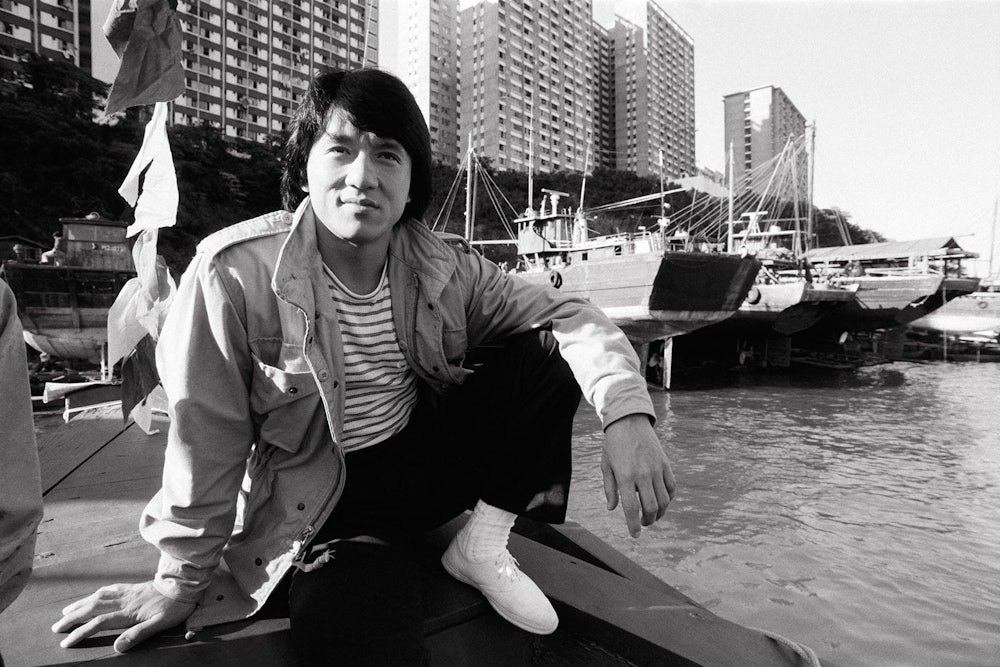There are many ways to tell the story of Jackie Chan. He is the heir to Charlie Chaplin and Buster Keaton, the comic grace of his movements leaving audiences in laughing wonder. He’s also the heir to Bruce Lee: If Lee broke old stereotypes about the Asian man being frail and craven, then Chan reinvented him once more, offering across dozens of movies a consistent character who was almost childlike in his cheerfulness, known as much for his winking smile as for the fury of his fists. Before 1995’s Rumble in the Bronx made him a household name in America, he was a filmmaker’s filmmaker, his elaborate fight sequences and death-enticing stunts the objects of devoted study by Steven Spielberg and James Cameron. And he helped bring martial arts into the Hollywood mainstream, so that nearly every American action hero, from Jason Bourne to the Black Panther, now boasts elements of karate or jujitsu in their repertoire of ass-kicking skills. The transfer was symbolically completed in 1999’s The Matrix, when Keanu Reeves, having downloaded a fighting program to his brain, opens his eyes and reverently whispers, “I know kung fu.”
These aspects of the Chan legend are all present in his new memoir, Never Grow Up, as the threads of an unlikely rags-to-riches story. The child of a cook and a maid—a “servant’s kid,” as he was derisively called—he rose from virtually nothing to become the most famous Chinese entertainer on earth. In the book’s introduction, his world-straddling triumph is represented by the lifetime achievement Oscar that he received in 2016, the only time it has ever been bestowed on a Chinese filmmaker. (The book’s jacket features him holding the golden statue with his eyes closed, as if he is saying a prayer to it.) And like all rags-to-riches stories—whether it’s Daddy Warbucks rescuing little orphan Annie, or an Indian slumdog becoming a millionaire—Chan’s is ultimately a tale about the place where he was born and raised and first made his mark: Hong Kong, which over the course of his lifetime went from being the last significant outpost of the British Empire to an ambiguous outlier of an ascendant China.
Never Grow Up, in mostly inadvertent ways, thus offers another way of telling Jackie Chan’s story. It’s about colonialism, capitalism, and the myths we construct to justify living under both.
When Chan was born in 1954, Hong Kong was fast becoming a haven for Chinese escaping communist rule on the mainland. This tiny city-state, some 400 square miles in total, had historically served as a foothold for European merchants seeking to gain access to the Chinese market, as the historian Jan Morris recounts in her book Hong Kong. After Mao and his gang took over in 1949, however, Western trade with China was shut off and Hong Kong became its own focal point, a center for both finance and industry, ultimately transforming into a mighty symbol of capitalism’s wealth-creating power on the very doorstep of the world’s most populous communist nation. As China suffered through famine and political upheaval and one miserable five-year-plan after another, Hong Kong sprouted an endless number of skyscrapers, which seemed to cast long, mocking shadows over its massive neighbor.
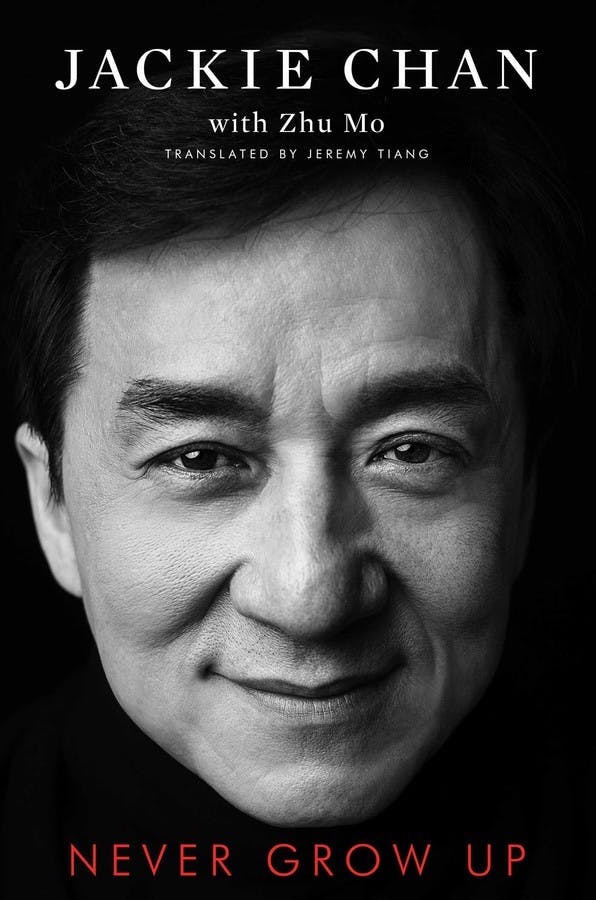
Chan’s parents, fleeing political persecution and seeking work, were among the emigrant laborers who formed the backbone of the Hong Kong economy in the immediate postwar decades. The Chans landed in Victoria Peak, a posh neighborhood high in the hills that is home to the wealthy and foreign diplomats. (It is now best known as a tourist site where one can take in Hong Kong’s famous topography from above, a bristling bowl of concrete and glass poised on the edge of the harbor.) Hong Kong was so important to the Chans that it was embedded in the name they gave their only son: Chan Kong-Sang, which means “born in Hong Kong.”
The British operated with a light touch in Hong Kong, at least compared to a place like New Delhi, which both administratively and culturally bore the deep imprint of empire. But Chan was nevertheless familiar with the racial dynamics of colonialism. His parents worked at the French consulate, “except we didn’t have a magnificent house that faced the street,” he writes. “Our home was run-down, small, and stuck in the back. The folks at the consulate treated us well, but from the very beginning, we existed in two different worlds.” He became enamored with a girl named Sophie, the “very beautiful” daughter of the French consul, and would stand up to boys who teased her, at one point thrashing the child of a French official. Chan’s father, terrified that he might lose his job, beat the young Chan with a belt, locked him in a shed for hours, then forced him to apologize to the boy and his family.
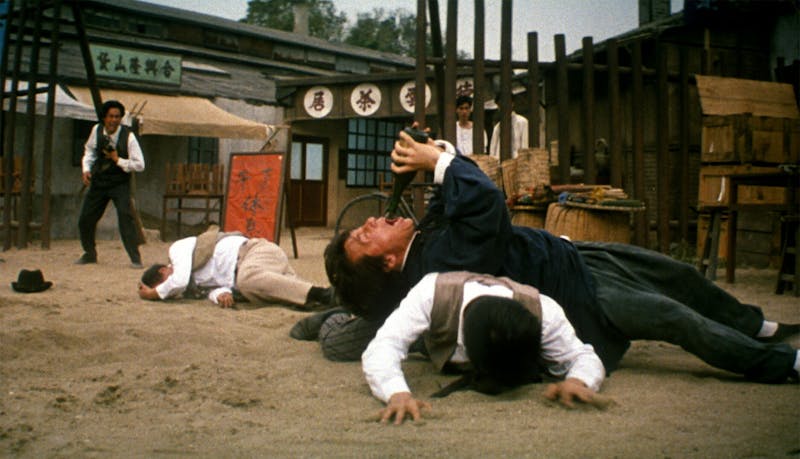
What impact these experiences had on Chan is hard to discern, since every episode in this memoir, even the most traumatic, is told with Chan’s indefatigable merriness, which as the book goes on starts to feel like a protective mechanism, a carapace of cheer. There is, too, an overarching sense of the phenomenal success that is to come, which casts a backwards glow even on those moments when Chan was at his lowest, cowering by the garbage bags in that lonely shed. Each trial is a stepping stone to the super-stardom that will legitimize everything that came before, rather than an examination of the ways in which being poor and Chinese in a colonial city in the 1950s might have messed a person up.
This blind spot is particularly apparent when Chan writes of the crucial formative experience in his life: When he was seven years old, his parents pulled him out of school and enrolled him at the China Drama Academy, which churned out performers for Peking operas and other entertainments. The Chans, who soon after would leave Hong Kong to pursue work in Australia, signed a ten-year contract with the academy, essentially consigning their son to a life of indentured servitude.
For ten years, Chan trained all day long, from 5 a.m. to 11 p.m., with breaks for lunch and dinner. Along with the other boys, he slept on a thin mat, on a carpet encrusted with sweat, spit, and piss. When he misbehaved, he was beaten with canes; when he fell ill, he was told to suck it up and keep practicing his kung fu. He received almost no education, not even in the basics of reading, writing, and arithmetic, and when he first became rich he had trouble signing his own name on credit card receipts. (His memoir is “co-written” with a publicist.) He was, in effect, a walking slab of meat to be trotted out whenever a Peking opera production needed a singer or dancer or acrobat. And when he began seeking work on movie sets in his teens, his master would take a 90 percent cut of his pay.
Chan was enmeshed in the vast underclass of the great Hong Kong economy, which to this day is jam-packed with underpaid laborers from around the world who live stacked on top of each other in dismal apartments the size of coffins. And yet the predominant sense in this memoir is that the obvious inequities of the China Drama Academy particularly and Hong Kong more broadly were outweighed by the amazing opportunities they afforded to a nobody like Chan Kong-Sang. He describes those ten years as his “decade of darkness,” but, he adds, “It was in those ten years that I became Jackie Chan.”
In other words, what to my mind reads like a brutal account of exploitation and abuse is meant to be inspirational, a testament not only to Chan’s personal fortitude, but also to a certain ethic. Indeed, in Chan’s case, the myth of the self-made man, predicated on hard work and sacrifice, is taken to its extreme, for the thing he willingly sacrifices over and over again, year in and year out, is his body. The China Drama Academy primarily contributed to Chan’s success in three ways: It facilitated lifelong friendships with fellow entertainers, like Sammo Hung, who in the early days got him jobs, then went on to co-star in some of his most famous movies; it prepared him for stuntwork and trained him in martial arts, which were his calling cards in Hong Kong’s down-and-dirty film industry; and it turned his body into an instrument that could withstand ungodly amounts of pain.
One of his first breaks came when a director demanded a perilous stunt—a tumbling leap from a high balcony—without a wire to catch the stuntman if it went awry. The stunt coordinator refused to let any of his men perform it. Then Chan volunteered, breaking what amounted to an ad hoc labor strike. “What’s the matter with you?” the coordinator asked. “Are you tired of living?” Chan, of course, pulled off the stunt—twice—establishing his reputation as a daredevil. As he started to star in his own films, culminating in his 1978 breakthrough Drunken Master, original stuntwork became one of his defining traits, alongside his comedic mien. “I always perform my own stunts,” he promises to readers, “no matter how dangerous.” And with that came scores of injuries, which were then showed to audiences after the movie was over, in a highlight reel as the credits rolled. These injuries included a disastrous fall during the filming of Armour of God (1986) that nearly killed him.
In his memoir, Chan proudly recounts the body parts he has shattered over the course of his career: nose, jaw, ankle, cranium. “My leg sometimes gets dislocated when I’m showering,” he writes of the toll his work has taken on him. “I need my assistant to help me click it back in.” This is presented as evidence of his dedication to the craft. It is also what makes him exceptional—not his brilliance or his smile or any other quality, but an almost masochistic willingness to risk his life for the camera. Those highlight reels, full of impossible leaps from the tops of buildings and other brushes with death, became the hallmark of his movies, more memorable than their plots or characters. By the time Rumble in the Bronx came around in the 1990s, Chan’s antics represented the awesome possibilities of what a human being could do on screen, soon to be surpassed by the hypnotic fireworks of CGI. But read as a Hong Kong success story, it leaves the unfortunate impression that the only way to make it in this town was to literally almost kill yourself with work.
It is a shame that Chan is unable to evoke in his writing the joyful magic of a Jackie Chan fight scene. The combatants often work in an improbably tight space, with a few props that either shift position or are smashed to pieces, so that the space changes in surprising ways, as if some unexpected dimension of reality is continually unfolding before your eyes.
It is a shame, too, that Chan does not say much about his filmmaking style. His Hong Kong, for example, is not that of John Woo (who pioneered the gritty, hardboiled aesthetic of action movies much imitated by Quentin Tarantino) or Wong Kar Wai (all sharp angles and reflections and harsh light, where even the raindrops are lambent with neon). It is something plainer, more straightforward, a bit ugly even: milky-gray sky, drab office interiors, identical white apartment blocks rising from the green hills with the regularity of a picket fence. The principal charm of this aesthetic, like a yellowing photograph, comes from age, dating Hong Kong to a specific moment in the 1980s and early 1990s, when it was at its peak and looking toward the 1997 handover to China with equal measures of hope and trepidation.
The reader is left not with a reminder of Jackie Chan’s genius, but with the rather sad story of his very successful life. It is an old colonial tale, the hapless provincial who becomes worldly, though in Chan’s case he doesn’t evolve beyond being a clownish parvenu. He writes about it with his usual high spirits: “How did it feel to go from being flat broke to being a millionaire, practically overnight? To go from being an uneducated loser to being a famous star? It was fantastic!” He drinks all the time. He totals expensive cars and buys new ones. He spends millions of dollars on fancy watches, chases beautiful women, and licenses a Jackie Chan brand of Australian wines. After he stars in Rush Hour with Chris Tucker in 1998, he becomes a bona fide star in America, producing a series of comic-action movies in his middle to old age that make him richer and more famous still.
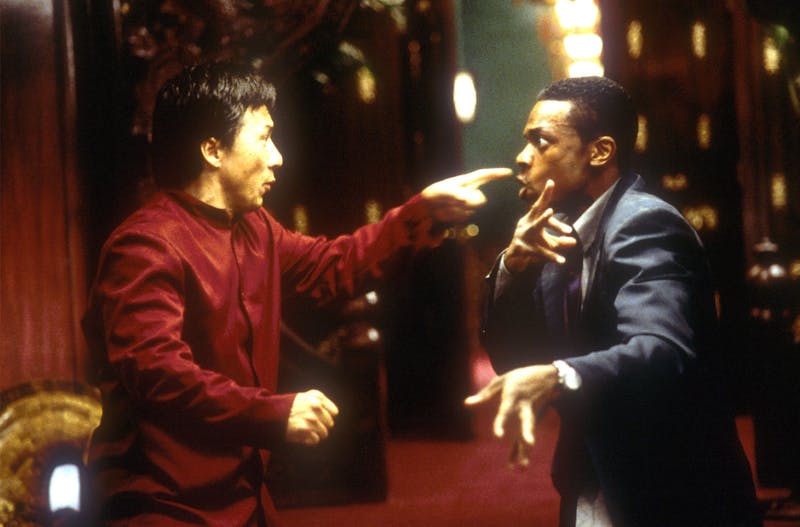
He marries and has a child—named Jaycee, after his own initials J.C.—but he hardly ever sees his family because he is constantly working. (He also has a child out of wedlock though this only warrants an offhand sentence.) He is at his most self-aware when discussing his workaholism. “When I was young, people looked down on me,” he writes. “As a young adult, I lived in poverty. When I finally found success, I was driven to give the world one good film after another, to show everyone what I was worth.” He is rich beyond his wildest dreams, but is unable to shed the poor young man he once was, a person desperate for work and afraid of the abyss that could open up at his feet at any moment. His poverty is a wound that never quite heals.
Those searing experiences have not translated into a sympathetic politics. As Hong Kong was absorbed by China, and as the mainland’s own cities came to rival Hong Kong for wealth and power, it held on to the one trait that truly made it a British colony, which is that it was not a democracy. It would appear that Chan would like to keep it that way, viewing Hong Kong’s democratic movement as a blemish on its reputation for frictionless commerce and order. “Hong Kong has become a city of protest,” he complained in 2012. “People scold China’s leaders, or anything else they like, and protest against everything.” In 2009 he said, “I don’t know whether it is better to have freedom or to have no freedom. With too much freedom, it can get very chaotic. It could end up like in Taiwan.” He added, “Chinese people need to be controlled, otherwise they will do whatever they want.” Indeed, China’s authoritarian-capitalist model, with its billion-plus consumers looking to spend time at the movies, suits Chan very well. He has moved his base of operations to Beijing and become a kind of soft-power ambassador for the Communist Party. He has made nationalist-inflected movies with a mainland production company.
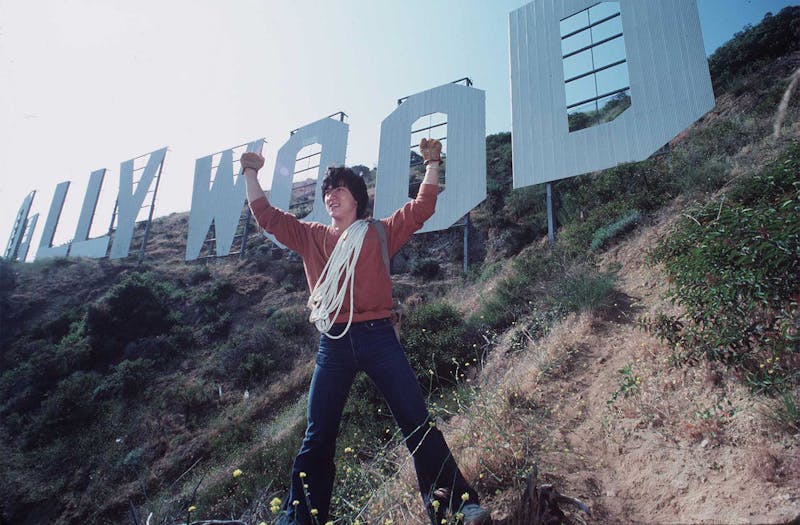
If Chan once represented what a Hong Konger could do with a little pluck and a little luck, his relentlessly buoyant memoir offers a different message: Life is hard, so one must be harder. It is an ethos that perhaps has been there all along. Police Story (1985), one of his best movies, concludes with an epic fight scene in a mega department store, that ubiquitous symbol of Hong Kong’s consumer economy. Against a backdrop of designer clothes and jewelry and electronics, Chan fights a whole gang of bad guys, sending them flying into mannequins and tumbling down escalators. There is shattered glass everywhere as bodies slam through display cases and storefronts. At one point, inexplicably, a motorcycle makes an appearance, careening through more panes of glass. When it looks like the head of the gang is about to get away, Chan leaps from the store’s top story onto a giant pole festooned with lights, sliding all the way down in a shower of electric sparks. (In his memoir he reveals he shouted the words “I die!” as he jumped.) He crashes into more glass at the bottom, and in one unbroken motion gets up and keeps fighting.
It remains a breathtaking scene, combining everything audiences have come to love about Jackie Chan: athleticism, derring-do, an everyman’s goodness. But there is something disturbing about it, too, the way Chan is both destroying and being destroyed by this mall. There is blood on his face, after all. And the blood is real.
